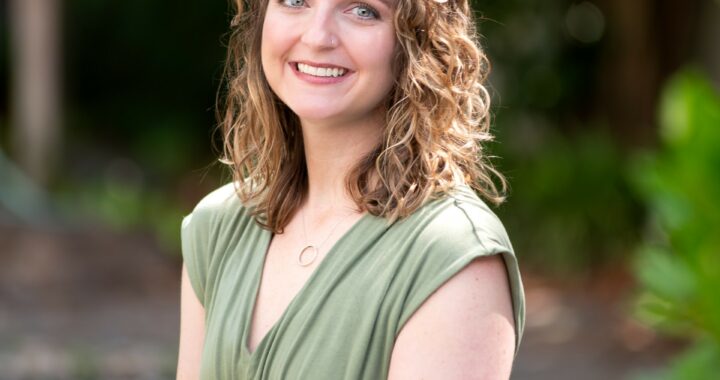UMW Alum Promotes Peace Corps
4 min readBY ANNIE KINNIBURGH
When UMW alumnus Stephanie Van Hook attended her first funeral in the African nation of Benin, she expected all the traditional trappings: solemn music, black clothing, and bereaved family. Instead, she found that in Africa funerals are a celebration of life.
“People come for the food and alcohol. It’s a party to commemorate the life of the person who died,” she said. “There’s dancing and music, and the whole village comes out. It took some getting used to.”
Life in Benin represented a whole different world from the one Van Hook left when she graduated from the University of Mary Washington in 2004. Similar to many college graduates, she was still unsure about career options, despite a double major in philosophy and French literature.
“I wasn’t sure what I wanted to do,” she said. “But I knew I wasn’t interested in searching for a job for money…I was more interested in searching for meaning and knowledge.”
This search eventually led her to the Peace Corps, through which she spent two years working in Benin. Van Hook returned to UMW on Sept. 10 to share her changed opinions on poverty, gender and life in a lecture sponsored by the Department of Classics, Philosophy and Religion.
To her former academic advisor Craig Vasey, her experiences were no surprise.
“Stephanie was always interested in women’s studies, women’s issues…really in justice in general,” Vasey, chair of CPR department, said.
Van Hook’s unlikely road to the Peace Corps began after graduation, when she traveled to Paris, using her French literature degree in the formerly-bohemian and now primarily-Muslim neighborhood of Montemarte. Her stay was brief but educational.
“It gave me a different perspective on the hardships experienced by a culture that is in the minority,” she said.
Van Hook’s interest in the Peace Corps piqued when she worked with returned Peace Corps volunteers at an exhibit in a local library in San Francisco. She embraced her assignment to Benin as an opportunity to effect immediate change.
“Other countries have presences in Africa but stay in the cities and don’t know where their money is being spent,” she said. “In the Peace Corps, we live in the villages with the people. It allows us to ask ourselves, ‘How do you really solve the problems these people are experiencing?'”
Working in a relatively stable and peaceful nation like Benin meant that Van Hook could focus on issues like gender equality and education, instead of the AIDS epidemic and civil wars that exist in other parts of southern Africa. Benin, bordered by Togo, Nigeria, and Burkina Faso, is a democratic republic, with a peaceful coexistence between the three major religions: Christianity, Islam, and the native Animism.
After three months of intensive cross-cultural training, health education and language lessons, the Peace Corps assigns volunteers to their respective villages, where they will spend the remainder of their two years working on projects to help the local people. Van Hook, one of 100 volunteers in Benin, lived 15 kilometers from the closest volunteer.
“I didn’t associate much with the other volunteers,” she said. “I didn’t go to Benin to create ties with Americans—I went to help people.”
In her first project in Benin, Van Hook taught 1st, 2nd and 3rd year English to a class of 50-60 students, mostly boys. The gender divide in her classroom alerted her to the unequal treatment of girls in Benin and led her to emphasize women’s rights in her work.
After speaking with local women, Van Hook then began teaching math and French to local orphaned girls who would otherwise miss an education entirely.
For Van Hook, being a white, foreign woman was both a disadvantage and an opportunity to change local customs.
“I tried to use my classroom to talk about issues that were taboo in the culture, and to help local girls. But there were still many misconceptions about me being there,” she said. “If I wasn’t there for money, I was there to flirt.”
However, despite biking alone between villages and a three-month period of living in an unlocked house, Van Hook discovered that her foreign status gave her an advantage.
“Safety was the first thing I thought about. I was probably the safest person in the village because I was a foreigner.”
Her unusual status led to unique experiences, including invitations to weddings and funerals in the local tradition and a night spent with a nearby nomadic tribe.
Van Hook refused to isolate herself; rather, she used the opportunity to explore aspects of an unknown culture. She practiced Islam during her stay, praying at the local mosque and often dressed in traditional African garb.
“I came to Benin a vegetarian who hated spicy foods,” she said. “But in Benin it’s important to get the nutrients you can out of the foods you eat. Now I eat spicy goat meat and love it.”
Now that she has returned from Benin, Van Hook appreciates everyday freedoms much more.
“The hardest thing was being humbled in terms of my gender,” she said. “We take so much for granted here.”
Her visit left an audience of UMW students and teachers appreciative of the world outside academics.
“I found Van Hook’s presentation to be poignant and inspiring,” said junior C.D. Dameron. “It’s too easy to get caught up in our own little worlds without seeing them in contrast to the bigger picture. Her depiction of gender in Africa also made me reevaluate my own privileged role in society.”
Inspired by her time in Benin, Van Hook will be studying Conflict Resolution at Portland State in Oregon.


